
Healthcare Technology Letters
Scope & Guideline
Connecting research and practice in health information management.
Introduction
Aims and Scopes
- Digital Health Innovations:
The journal publishes research on digital health technologies, including telemedicine, mobile health applications, and IoT systems that facilitate patient monitoring and engagement. - Artificial Intelligence Applications:
There is a strong emphasis on the application of machine learning and artificial intelligence in healthcare, addressing problems such as disease classification, risk prediction, and decision support systems. - Medical Imaging and Diagnostics:
Research focused on advanced imaging techniques, including the use of neural networks for image analysis and real-time monitoring, is prevalent, highlighting the importance of accurate diagnostics. - Surgical Technology and Robotics:
The journal explores innovations in surgical technology, including robotic surgery, augmented reality guidance systems, and mixed reality applications that enhance surgical precision and training. - Wearable and Remote Monitoring Technologies:
Studies on wearable devices and remote monitoring systems are common, focusing on their role in chronic disease management and rehabilitation.
Trending and Emerging
- Integration of AI in Patient Care:
Recent papers increasingly explore the integration of artificial intelligence in various aspects of patient care, such as predictive analytics and personalized medicine, showcasing the transformative potential of AI. - Telehealth and Remote Care Solutions:
The significance of telehealth has surged, particularly post-pandemic, with a growing number of studies focused on remote care technologies and their efficacy in enhancing patient access and engagement. - Augmented and Virtual Reality in Surgery:
Research on the use of augmented and virtual reality technologies for surgical training and procedures is on the rise, indicating a trend towards immersive learning and enhanced surgical precision. - Wearable Technology for Health Monitoring:
There is a notable increase in studies related to wearable technology for health monitoring, emphasizing their role in chronic disease management and real-time health data acquisition. - Mental Health Technology Solutions:
Emerging research is focusing on technological solutions for mental health, including AI-driven assessments and mobile applications for self-management, reflecting a growing recognition of mental health's importance.
Declining or Waning
- Conventional Medical Practices:
Research on traditional medical practices and non-technological interventions is becoming less frequent as the focus shifts towards more innovative, tech-driven solutions. - Basic Health Informatics:
There is a noticeable decline in studies that merely address basic health informatics without integrating advanced technologies such as AI or machine learning. - General Healthcare Management:
Papers that discuss general healthcare management strategies without a strong technological component are appearing less frequently, indicating a preference for technology-centric approaches. - Static Rehabilitation Techniques:
Research on static or conventional rehabilitation methods is decreasing, with more emphasis on dynamic, technology-enhanced rehabilitation solutions. - Single-Discipline Approaches:
There is a reduction in studies focusing solely on a single discipline within healthcare, as interdisciplinary approaches that integrate multiple fields are gaining traction.
Similar Journals

Journal of Medical Signals & Sensors
Advancing Biomedical Technology for a Healthier TomorrowJournal of Medical Signals & Sensors, published by Wolters Kluwer Medknow Publications, is a pioneering platform in the fields of Biomedical Engineering, Computer Science, and Health Informatics, focusing on innovative research and advancements in medical technology. With an Open Access policy since 2012, the journal promotes widespread dissemination of knowledge, aiming to facilitate the sharing of vital insights and developments among researchers, healthcare professionals, and students globally. The journal has achieved commendable rankings in its various categories, including Q3 in Biomedical Engineering and Radiology, underscoring its importance in advancing health technology and informatics. Its commitment to rigorous peer review ensures that published works are of the highest quality, making it a valuable resource for those engaged in cutting-edge medical research. With annual publications planned through 2024, the Journal of Medical Signals & Sensors continues to expand its influence and relevance in a rapidly evolving scientific landscape.
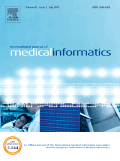
INTERNATIONAL JOURNAL OF MEDICAL INFORMATICS
Advancing Health Through Informatics InnovationInternational Journal of Medical Informatics, published by Elsevier Ireland Ltd, is a premier peer-reviewed journal dedicated to advancing the field of health informatics. Established in 1997, this journal has consistently strived to disseminate high-quality research and innovative practices, now recognized in the Q1 quartile of health informatics for 2023, ranking impressively at #24 out of 138 in Scopus. The journal's focus encompasses the integration of computer science and information technology in healthcare, fostering discussions on data management, telemedicine, health information systems, and decision support mechanisms. With an ISSN of 1386-5056 and E-ISSN of 1872-8243, it provides options for both subscription and open access, ensuring broad dissemination of research findings. As a vital resource for researchers, professionals, and students in the rapidly evolving domain of medical informatics, the International Journal of Medical Informatics is positioned to be at the forefront of knowledge translation in the health sector, contributing significantly to improvements in patient care and healthcare delivery.
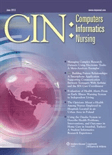
CIN-COMPUTERS INFORMATICS NURSING
Catalyzing Change in Healthcare through Informatics ResearchCIN-COMPUTERS INFORMATICS NURSING is a distinguished journal that publishes cutting-edge research at the intersection of nursing and information technology. Published by Lippincott Williams & Wilkins, the journal has been a pivotal platform since 2002, catering to the needs of health informatics professionals and nursing researchers. With an impressive impact factor and ranked within Q2 in Nursing (miscellaneous) and other relevant categories, it serves as a key resource for advancing knowledge and best practices in the field. The journal's inclusion in important databases ensures broad visibility and access to the latest findings that influence healthcare delivery. CIN-COMPUTERS INFORMATICS NURSING welcomes a diverse range of articles, including empirical studies, reviews, and innovative methodology approaches, making it an invaluable asset for clinicians, educators, and scholars dedicated to enhancing nursing informatics and improving patient outcomes.
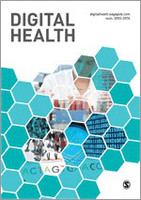
Digital Health
Shaping Health Outcomes Through Open Access Research.Digital Health is a pioneering open-access journal published by SAGE Publications Ltd, dedicated to advancing the field of health technology and its intersection with health policy, informatics, and the broader medical landscape. Since its inception in 2015, the journal has rapidly established itself as an essential resource for researchers, professionals, and students, serving as a platform for innovative research that leverages digital tools to improve health outcomes. Currently ranked in the Q2 category across four relevant domains, including Computer Science Applications and Health Informatics, it commands respect within the academic community. With its accessible framework, Digital Health facilitates the dissemination of critical findings and new methodologies that inform policy and practice. The journal’s commitment to open access promotes worldwide access and cooperation, making significant contributions to the evolving landscape of digital health.

npj Digital Medicine
Revolutionizing Healthcare through Digital Innovationnpj Digital Medicine is a leading journal in the interdisciplinary landscape of digital health, published by NATURE PORTFOLIO. Since its inception in 2018, this open-access journal has rapidly established itself as a premier platform for innovative research and insights at the intersection of technology and healthcare. With an impressive impact factor and ranked in the Q1 category across multiple fields—including Computer Science Applications, Health Informatics, and Medicine—npj Digital Medicine represents the forefront of research aimed at revolutionizing patient care and healthcare delivery through digital advancements. The journal is positioned in the top percentiles of Scopus rankings, highlighting its vital role in shaping the future of medicine in an increasingly digital world. By providing a space for rigorous research and practical applications, npj Digital Medicine invites contributions from researchers, clinicians, and technologists eager to explore novel solutions to contemporary health challenges, ultimately enhancing patient outcomes on a global scale.
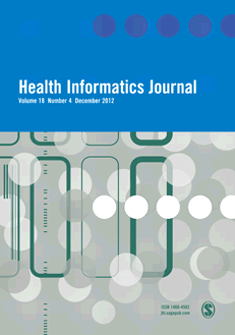
Health Informatics Journal
Exploring the future of healthcare through informatics.Health Informatics Journal, published by SAGE Publications Inc., serves as a premier platform for research and discussion in the dynamic field of health informatics since its inception in 1995. With an impressive Q2 ranking in the Health Informatics category and a notable 77th percentile ranking in the Scopus database, this journal provides an essential resource for academics and professionals alike. The journal's transition to Open Access since 2020 has further broadened its reach, ensuring that innovative research is accessible to a global audience. Covering a wide range of topics within health informatics, the journal aims to foster high-quality scholarly communication and facilitate the dissemination of cutting-edge insights that can help advance health care delivery and patient outcomes. With an ongoing commitment to excellence, the Health Informatics Journal is dedicated to enhancing the intersection of technology and healthcare through rigorous research and collaborative exploration.
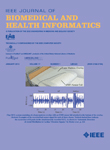
IEEE Journal of Biomedical and Health Informatics
Driving Innovation in Health Informatics and Patient CareIEEE Journal of Biomedical and Health Informatics is a premier publication dedicated to advancing the field of biomedical and health informatics. Published by the esteemed IEEE-Inst Electrical Electronics Engineers Inc, this journal boasts a notable impact within various disciplines, ranking in the top quartile (Q1) across key categories such as Biotechnology, Computer Science Applications, Electrical and Electronic Engineering, Health Informatics, and Health Information Management as of 2023. With a strong Scopus ranking—placing it at #11 in Health Informatics and #6 in Health Information Management—it serves as a vital resource for cutting-edge research and innovative practices. Open Access options enhance accessibility, fostering collaboration among researchers, professionals, and students. Since its inception in 2013, the journal has been committed to publishing high-quality, peer-reviewed articles that explore the pivotal intersection between technology and healthcare, thereby contributing significantly to the evolution of medical practices and patient care.

JMIR mHealth and uHealth
Advancing Mobile Health for a Better TomorrowJMIR mHealth and uHealth is a leading peer-reviewed journal that focuses on the innovative aspects of mobile health (mHealth) and the utilization of technology in health care, published by JMIR Publications, Inc. Since its inception in 2013, this Open Access journal has rapidly established itself as a vital resource in the realm of health informatics, currently ranked #13 out of 138 in the Scopus category of Medicine - Health Informatics, placing it in the top 10th percentile. With a Q1 ranking in Health Informatics for 2023, it is recognized for its high-quality research contributions and significant impact in shaping the future of health technology. The journal serves as an essential platform for researchers, professionals, and students seeking to advance their understanding of how mobile solutions can enhance health outcomes and patient engagement. Accessible to a global audience, JMIR mHealth and uHealth aims to foster collaboration and innovation in the fields of mHealth and uHealth, encouraging the dissemination of research that transforms health care practices.

Lancet Digital Health
Exploring the Intersection of Technology and Patient Care.Lancet Digital Health is an esteemed Open Access journal published by ELSEVIER, dedicated to advancing the interdisciplinary field of digital health. Since its inception in 2019, the journal has rapidly established itself as a leading platform for disseminating high-quality research focusing on the implications of digital technology in healthcare delivery, health informatics, and patient management. Renowned for its rigorous peer-review process and commitment to academic excellence, Lancet Digital Health currently holds prestigious Q1 rankings across multiple categories including Decision Sciences, Health Informatics, and Medicine (miscellaneous) as of 2023. With an impressive impact in its field—ranked #1 in Health Informatics and within the top percentile of related disciplines—this journal offers vital insights into the ongoing transformations within health systems globally. Researchers, healthcare professionals, and students alike will find a wealth of cutting-edge studies, practical applications, and discussions on the future of digital health, fostering an evidence-based dialogue that is essential in today's rapidly evolving medical landscape.

Health and Technology
Elevating Health Standards Through Technological AdvancementsHealth and Technology, published by SPRINGER HEIDELBERG, is a prominent journal in the interdisciplinary realms of health sciences and technology, with a particular focus on the innovative applications of technology in healthcare settings. With a robust ISSN of 2190-7188 and E-ISSN 2190-7196, the journal has been making significant contributions to the field since its inception in 2011. As of 2023, it is recognized within the Q2 category in Applied Microbiology and Biotechnology, Biomedical Engineering, and Biotechnology, alongside a Q3 ranking in Bioengineering, reflecting its ongoing relevance and impact in these dynamic fields. Its commendable Scopus rankings underscore its commitment to high-quality research, being placed favorably among peers: #86 in Biomedical Engineering and #38 in Applied Microbiology and Biotechnology. Although not currently an Open Access journal, Health and Technology offers a wealth of scholarly content that is crucial for researchers, professionals, and students seeking to explore the intersection of health and technological advancements. With a converged publication timeline extending to 2024, the journal remains a vital resource for those striving to push the boundaries of innovation in health technology.